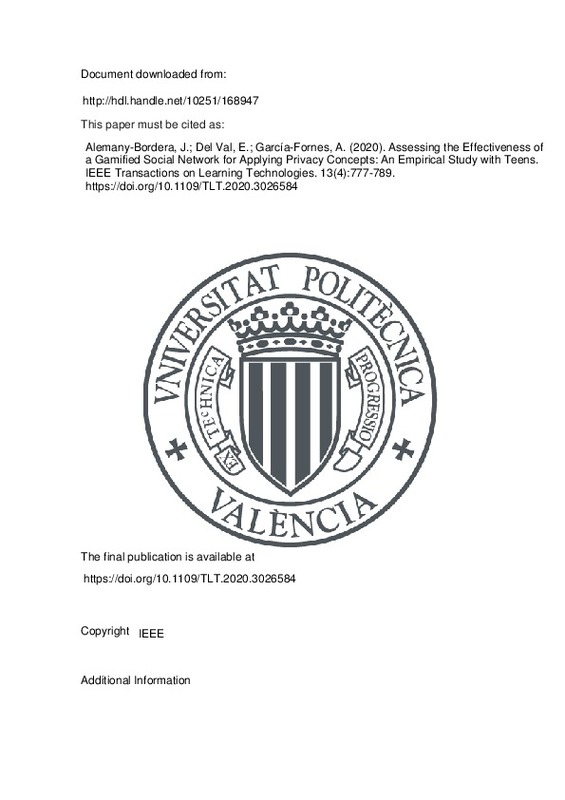JavaScript is disabled for your browser. Some features of this site may not work without it.
Buscar en RiuNet
Listar
Mi cuenta
Estadísticas
Ayuda RiuNet
Admin. UPV
Assessing the Effectiveness of a Gamified Social Network for Applying Privacy Concepts: An Empirical Study with Teens
Mostrar el registro sencillo del ítem
Ficheros en el ítem
| dc.contributor.author | Alemany-Bordera, José
|
es_ES |
| dc.contributor.author | Del Val, Elena
|
es_ES |
| dc.contributor.author | García-Fornes, A
|
es_ES |
| dc.date.accessioned | 2021-07-08T03:31:36Z | |
| dc.date.available | 2021-07-08T03:31:36Z | |
| dc.date.issued | 2020-10-01 | es_ES |
| dc.identifier.uri | http://hdl.handle.net/10251/168947 | |
| dc.description.abstract | [EN] The concept of privacy in online social networks (OSNs) is a challenge, especially for teenagers. Previous works deal with teaching about privacy using educational online content, and media literacy. However, these tools do not necessarily promote less risky behaviors, and do not allow the assessment of users' behavior after the learning period. Moreover, few research studies about the effects of social gamification have been performed for this population segment (i.e., teenagers). To address this problem in this article, we propose the use of gamification in an OSN called Pesedia to facilitate the teaching/learning process, and assess its effectiveness in promoting suitable privacy behaviors. We tested our proposal comparing teenagers' performance in two editions of a course about social networks, and privacy (with, and without gamification) for one month. We measured the impact of gamification in the participants' behaviors toward privacy concepts as a consequence of the privacy teaching/learning process, and the participants' engagement in the educational process. The results show that there are significant differences in participants' behavior regarding privacy, and engagement in the gamified social network. Moreover, there is also a significant difference in participants' engagement for the gamified male participants. The gamified social network proposed in this article may be relevant, and useful for educators who wish to develop, and enhance teenagers' privacy skills, or for a broader base of aspects related to the development of digital competences, and technology in education. | es_ES |
| dc.description.sponsorship | This work was supported in part by the Spanish Government Project TIN2017-89156-R, and in part by the FPI under Grant BFS-2015-074498. (Corresponding author: Elena Del Vol.) | es_ES |
| dc.language | Inglés | es_ES |
| dc.publisher | IEEE | es_ES |
| dc.relation.ispartof | IEEE Transactions on Learning Technologies | es_ES |
| dc.rights | Reserva de todos los derechos | es_ES |
| dc.subject | Social network services | es_ES |
| dc.subject | Privacy | es_ES |
| dc.subject | Education | es_ES |
| dc.subject | Tools | es_ES |
| dc.subject | Games | es_ES |
| dc.subject | Europe | es_ES |
| dc.subject | Media | es_ES |
| dc.subject | Gamification | es_ES |
| dc.subject | Learning technologies | es_ES |
| dc.subject | Social networks | es_ES |
| dc.subject | Teenagers | es_ES |
| dc.subject.classification | LENGUAJES Y SISTEMAS INFORMATICOS | es_ES |
| dc.title | Assessing the Effectiveness of a Gamified Social Network for Applying Privacy Concepts: An Empirical Study with Teens | es_ES |
| dc.type | Artículo | es_ES |
| dc.identifier.doi | 10.1109/TLT.2020.3026584 | es_ES |
| dc.relation.projectID | info:eu-repo/grantAgreement/AEI/Plan Estatal de Investigación Científica y Técnica y de Innovación 2013-2016/TIN2017-89156-R/ES/AGENTES INTELIGENTES PARA ASESORAR EN PRIVACIDAD EN REDES SOCIALES/ | es_ES |
| dc.relation.projectID | info:eu-repo/grantAgreement/MINECO//BES-2015-074498/ES/BES-2015-074498/ | es_ES |
| dc.rights.accessRights | Abierto | es_ES |
| dc.contributor.affiliation | Universitat Politècnica de València. Departamento de Sistemas Informáticos y Computación - Departament de Sistemes Informàtics i Computació | es_ES |
| dc.description.bibliographicCitation | Alemany-Bordera, J.; Del Val, E.; García-Fornes, A. (2020). Assessing the Effectiveness of a Gamified Social Network for Applying Privacy Concepts: An Empirical Study with Teens. IEEE Transactions on Learning Technologies. 13(4):777-789. https://doi.org/10.1109/TLT.2020.3026584 | es_ES |
| dc.description.accrualMethod | S | es_ES |
| dc.relation.publisherversion | https://doi.org/10.1109/TLT.2020.3026584 | es_ES |
| dc.description.upvformatpinicio | 777 | es_ES |
| dc.description.upvformatpfin | 789 | es_ES |
| dc.type.version | info:eu-repo/semantics/publishedVersion | es_ES |
| dc.description.volume | 13 | es_ES |
| dc.description.issue | 4 | es_ES |
| dc.identifier.eissn | 1939-1382 | es_ES |
| dc.relation.pasarela | S\423285 | es_ES |
| dc.contributor.funder | Agencia Estatal de Investigación | es_ES |
| dc.contributor.funder | Ministerio de Economía y Competitividad | es_ES |
| dc.subject.ods | 04.- Garantizar una educación de calidad inclusiva y equitativa, y promover las oportunidades de aprendizaje permanente para todos | es_ES |







![[Cerrado]](/themes/UPV/images/candado.png)

